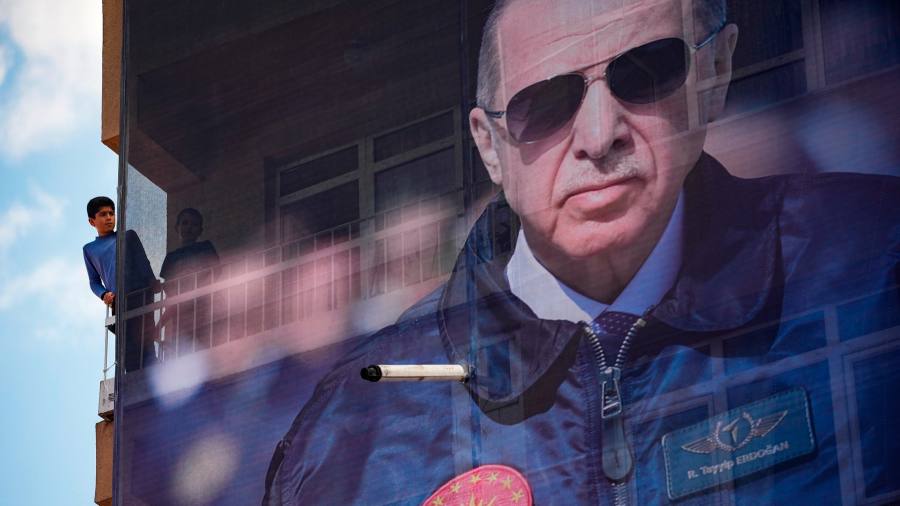The writer is author of ‘Turkey Under Erdoğan’
There is one question on many people’s minds in Turkey today: how did pollsters get it wrong? Recep Tayyip Erdoğan was trailing in most surveys ahead of Sunday’s presidential elections. Analysts expected the tanking economy, along with the state’s lacklustre response to the deadly earthquakes in February, to undermine support for the incumbent president.
Kemal Kılıçdaroğlu, the opposition contender, was expected to come first in this opening round — or even clear the 50 per cent threshold for an outright win. In fact, the opposite happened. According to electoral authorities, Erdoğan secured 49.5 per cent of the vote with Kılıçdaroğlu more than 4 percentage points behind. Not only that, but the electoral alliance around the governing Justice and Development party (AKP) appears to have retained its legislative majority. Another Erdoğan term in power, following a run-off on May 28, looks likely.
Some conservative voters did abandon the AKP mother ship, which is why Erdoğan did not emerge victorious after the first round, unlike in 2014 and 2018. But there was also much hidden support for the reis (or captain, as he is known to his ardent supporters). Shy conservatives did not necessarily reveal their preferences to pollsters: his strongman brand has long lost its public shine.
Turkish nationalism is also in the mix. It was clear from the get-go that a Kılıçdaroğlu victory would need the backing of the pro-Kurdish Peoples’ Democracy Party (HDP). That made it easy to paint him as a sellout to a force which many see as an extension of the outlawed Kurdistan Workers’ party (PKK), a militant organisation that has fought the state since the 1980s. As a result, some voters decided to back Erdoğan or Sinan Oğan, a nationalist candidate who took a hard line on the Kurdish issue and did unexpectedly well. Dog-whistle tactics played a role too. Kılıçdaroğlu, who revealed his heterodox Alevi heritage during the campaign, has been exposed to “he is not a real Turk” innuendo.
In the weeks ahead, Erdoğan will capitalise on his momentum. He will lure Oğan’s supporters with promises to wipe out the PKK from the south-east as well as in Iraq and Syria. There will be ever more generous offers to the electorate: welfare spending, higher wages and pensions, reconstruction in the crisis-stricken regions. Erdoğan will tout Turkey’s status as a first-rate regional power in a multipolar world. With the media largely on his side, he could easily pull off yet another victory.
If he does, a new term could see Erdoğan tightening the screws on the opposition. His next goal would be to recover Istanbul and Ankara, two cities AKP lost in 2019, in next year’s local elections. And if he wins, this would be Erdogan’s last constitutional term as president — unless, like Vladimir Putin in Russia, he were to rewrite the rules to extend his tenure beyond 2028.
Yet a new presidential term would not be an easy ride. The AKP may have concluded that they can muddle through economic crises, despite Erdogan’s meddling in monetary policy and the undue influence of clientelism around the presidential palace. Investment from the Gulf and burgeoning exports to Russia, with Turkey refusing to join western sanctions, provides some comfort. But the lira remains vulnerable. Runaway inflation will continue to erode living standards, adding to discontent. High energy prices and post-quake reconstruction will put more pressure on the country’s fiscal balance.
Both Putin and Ukrainian president Volodymyr Zelenskyy will have reason to be happy if Erdoğan stays in office. He has strong ties with Moscow and Kyiv and would continue to reap the benefits of being the middleman. There would be some back-and-forth on Sweden’s Nato membership but a deal before the alliance’s July summit is probably within reach. At the same time, Erdoğan will keep fanning anti-western and anti-US sentiments at home.
A Kılıçdaroğlu victory might have spelt an opening in relations with the EU. However, one by Erdoğan will not necessarily mean friction. In contrast to past elections, this one was not accompanied by rhetorical outbursts against Brussels and core member states. Turkey will depend on EU financial inflows, be it a renewal of the refugee deal next year or reconstruction aid. The EU will count on Erdoğan to keep migration in check and to mediate in Ukraine.
Another five years under Erdoğan might jeopardise democratic rule in Turkey and strain relations with the west. But in the longer term all is not lost. Despite Sunday’s result, the opposition and society have shown enough resilience in this election to suggest that there is still life in Turkish democracy.
Read the full article here
